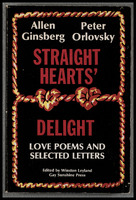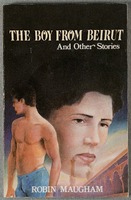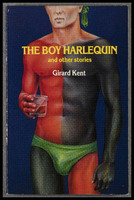Items
Theme is exactly
Gay Sunshine Press
-
 Straight hearts' delight : love poems and selected letters, 1947-1980 Containing thirty years of poetry and numerous letters, this book relates the lives and works of two key figures of the Beat Generation. Documenting chronologically the relationship between Allen Ginsberg (1926-1997) and Peter Orlovsky (1933-2010), the book is not only a record of their love but also of the milieu in which they lived and worked. The book contains previously unpublished poems and is illustrated, including with a Richard Avedon photograph of the authors naked. Edited by Winston Leyland, the authors were involved in the book’s production and contributed footnotes. As with many Gay Sunshine Press (and Fag Rag) publications, it was made possible in part by a grant from the National Endowment for the Arts, an independent federal agency established by the US Congress.
Straight hearts' delight : love poems and selected letters, 1947-1980 Containing thirty years of poetry and numerous letters, this book relates the lives and works of two key figures of the Beat Generation. Documenting chronologically the relationship between Allen Ginsberg (1926-1997) and Peter Orlovsky (1933-2010), the book is not only a record of their love but also of the milieu in which they lived and worked. The book contains previously unpublished poems and is illustrated, including with a Richard Avedon photograph of the authors naked. Edited by Winston Leyland, the authors were involved in the book’s production and contributed footnotes. As with many Gay Sunshine Press (and Fag Rag) publications, it was made possible in part by a grant from the National Endowment for the Arts, an independent federal agency established by the US Congress. -
 The boy from Beirut : and other stories Robin Maugham (1916-1981), Second Viscount Maugham of Hartfield and nephew of the novelist W. Somerset Maugham, wrote short stories, novels, screenplays, plays and non-fiction. “Bisexual, though predominantly homosexual”, as he put it, Maugham published his first short story in 1943 (‘The 1946 Ms’, praised by George Orwell), turning more to gay themes in his post-1970 work. Published posthumously, Maugham’s ‘The Boy from Beirut’ consists of eight short stories, introduced by writer and former editor for ‘Gay News’, Peter Burton. These stories draw partly on Maugham’s time in North Africa during the Second World War and had all previously been published in the UK. The volume closes with Burton’s long interview with Maugham, first published in ‘Gay Sunshine’ magazine in the Summer/Fall edition, 1977 (no. 33/34).
The boy from Beirut : and other stories Robin Maugham (1916-1981), Second Viscount Maugham of Hartfield and nephew of the novelist W. Somerset Maugham, wrote short stories, novels, screenplays, plays and non-fiction. “Bisexual, though predominantly homosexual”, as he put it, Maugham published his first short story in 1943 (‘The 1946 Ms’, praised by George Orwell), turning more to gay themes in his post-1970 work. Published posthumously, Maugham’s ‘The Boy from Beirut’ consists of eight short stories, introduced by writer and former editor for ‘Gay News’, Peter Burton. These stories draw partly on Maugham’s time in North Africa during the Second World War and had all previously been published in the UK. The volume closes with Burton’s long interview with Maugham, first published in ‘Gay Sunshine’ magazine in the Summer/Fall edition, 1977 (no. 33/34). -
 The boy harlequin : and other stories Fourteen short stories from a now little-known American author Girard Kent, the nom-de-plume of a Texan writer named Lon Rogers. Though the collection did well enough for Gay Sunshine Press to bring out a second edition in 1985, its mildly distasteful blend of humour and eroticism has not dated well. Several stories feature sexual relationships between adolescent boys and adult men, and as a perceptive contemporary review in New Zealand magazine ‘Pink Triangle’ noted, the characters feel more like “fantasy material” than fully realised protagonists. ‘The Boy Harlequin’ was Kent’s first book, and he seems to have published nothing further, either under his own name or his pen name.
The boy harlequin : and other stories Fourteen short stories from a now little-known American author Girard Kent, the nom-de-plume of a Texan writer named Lon Rogers. Though the collection did well enough for Gay Sunshine Press to bring out a second edition in 1985, its mildly distasteful blend of humour and eroticism has not dated well. Several stories feature sexual relationships between adolescent boys and adult men, and as a perceptive contemporary review in New Zealand magazine ‘Pink Triangle’ noted, the characters feel more like “fantasy material” than fully realised protagonists. ‘The Boy Harlequin’ was Kent’s first book, and he seems to have published nothing further, either under his own name or his pen name.
